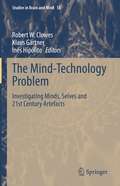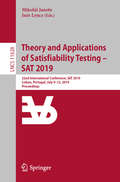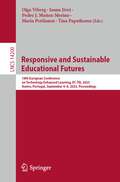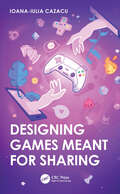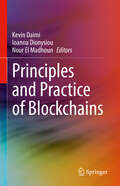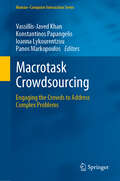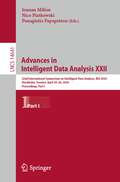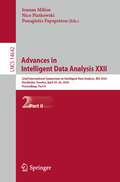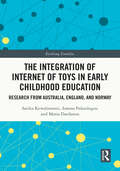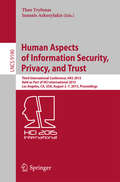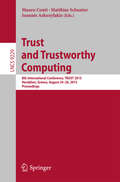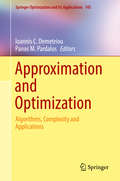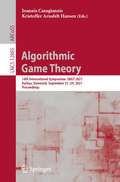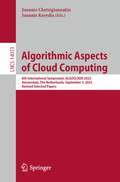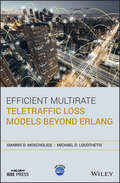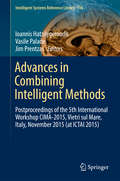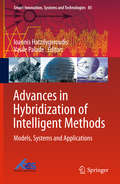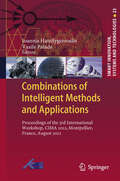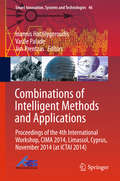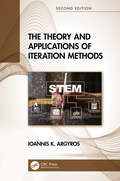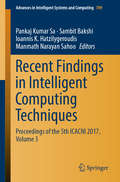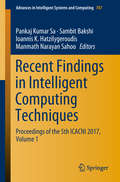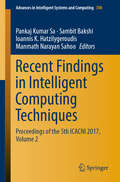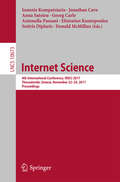- Table View
- List View
The Mind-Technology Problem: Investigating Minds, Selves and 21st Century Artefacts (Studies in Brain and Mind #18)
by Inês Hipólito Robert W. Clowes Klaus GärtnerThis edited book deepens the engagement between 21st century philosophy of mind and the emerging technologies which are transforming our environment. Many new technologies appear to have important implications for the human mind, the nature of our cognition, our sense of identity and even perhaps what we think human beings are. They prompt questions such as: Would an uploaded mind be 'me'? Does our reliance on smart phones, or wearable gadgets enhance or diminish the human mind? and: How does our deep reliance upon ambient artificial intelligence change the shape of the human mind? Readers will discover the best philosophical analysis of what current and near future 21st technology means for the metaphysics of mind. Important questions are addressed on matters relating to the extended mind and the distributed self. Expert authors explore the role that the ubiquitous smart phone might have in creating new forms of self-knowledge. They consider machine consciousness, brain enhancement and smart ambient technology, and what they can tell us about phenomenal consciousness. While ideas of artificial general intelligence, cognitive enhancements and the smart environment are widely commented on, serious analysis of their philosophical implications is only getting started. These contributions from top scholars are therefore very timely, and are of particular relevance to students and scholars of the philosophy of mind, philosophy of technology, computer science and psychology.
Theory and Applications of Satisfiability Testing – SAT 2019: 22nd International Conference, SAT 2019, Lisbon, Portugal, July 9–12, 2019, Proceedings (Lecture Notes in Computer Science #11628)
by Mikoláš Janota Inês LynceThis book constitutes the refereed proceedings of the 22nd International Conference on Theory and Applications of Satisfiability Testing, SAT 2019, held in Lisbon, Portugal, UK, in July 2019. The 19 revised full papers presented together with 7 short papers were carefully reviewed and selected from 64 submissions. The papers address different aspects of SAT interpreted in a broad sense, including (but not restricted to) theoretical advances (such as exact algorithms, proof complexity, and other complexity issues), practical search algorithms, knowledge compilation, implementation-level details of SAT solvers and SAT-based systems, problem encodings and reformulations, applications (including both novel application domains and improvements to existing approaches), as well as case studies and reports on findings based on rigorous experimentation.
Responsive and Sustainable Educational Futures: 18th European Conference on Technology Enhanced Learning, EC-TEL 2023, Aveiro, Portugal, September 4–8, 2023, Proceedings (Lecture Notes in Computer Science #14200)
by Pedro J. Muñoz-Merino Olga Viberg Ioana Jivet Maria Perifanou Tina PapathomaThis book constitutes the proceedings of the 18th European Conference on Technology Enhanced Learning, EC-TEL 2023, held in Aveiro, Portugal, in September 2023.The 34 full papers included in this volume were carefully reviewed and selected from 126 submissions. Additionally, 24 posters and 16 demonstration papers were included in the proceedings. The papers focus on sustainable teaching and learning practices in the post-pandemic educational ecosystem.
Designing Games Meant for Sharing
by Ioana-Iulia CazacuThis book talks about the importance of social mechanics in games and how these mechanics evolved over time to accommodate new technologies and new social contexts. It looks at the innovation happening in the field of new-age social games, discussing in detail what has been learnt from designing for the younger generation, how these findings can inform game design philosophy and how this can be applied to game development more broadly.Part 1 of this book provides a brief history of games as social interaction and discusses the differences between online and offline social gaming. Part 2 covers Facebook social gaming and design lessons from first-generation social games. Part 3 introduces design philosophies for the hyper-social genre and includes an important chapter on design ethics. Finally, Part 4 looks ahead to the future of social games and how game designers can incorporate learnings from this book in their own work.This book will appeal to game designers and students of game design looking to learn how to apply learnings from social game design in their own games.
Principles and Practice of Blockchains
by Kevin Daimi Nour El Madhoun Ioanna DionysiouThis book provides an essential compilation of relevant and cutting edge academic and industry work on key Blockchain topics. This book concentrates on a wide range of advances related to Blockchains which include, among others, Blockchain principles, architecture and concepts with emphasis on key and innovative theories, methodologies, schemes and technologies of Blockchain, Blockchain platforms and architecture, Blockchain protocols, sensors and devices for Blockchain, Blockchain foundations, and reliability analysis of Blockchain-based systems. Further, it provides a glimpse of future directions where cybersecurity applications are headed. The book is a rich collection of carefully selected and reviewed manuscripts written by diverse cybersecurity application experts in the listed fields and edited by prominent cybersecurity applications researchers and specialists.
Macrotask Crowdsourcing: Engaging the Crowds to Address Complex Problems (Human–Computer Interaction Series)
by Panos Markopoulos Vassillis-Javed Khan Konstantinos Papangelis Ioanna LykourentzouCrowdsourcing is an emerging paradigm that promises to transform several domains: creative work, business work, cultural cooperation, etc. Crowdsourcing reflects the close-knit interplay between the latest computer technologies, the rapidly changing work model of the 21st century, and the very nature of people. The interplay makes for an exciting but at the same time challenging new field to investigate under the lens of a diverse set of disciplines, ranging from the technical to the social and from the theoretical to the applied. Early research has focused on an aspect of crowdsourcing known as micro-tasking. Micro-tasks are simple tasks (like image annotations) that anyone could perform. An emerging area is how to utilize crowdsourcing to solve problems that go beyond simple tasks towards more complex ones, that require collaboration and creativity. In juxtaposition to micro-task crowdsourcing, this book investigates macro-task crowdsourcing and its potential.
Advances in Intelligent Data Analysis XXII: 22nd International Symposium on Intelligent Data Analysis, IDA 2024, Stockholm, Sweden, April 24–26, 2024, Proceedings, Part I (Lecture Notes in Computer Science #14641)
by Nico Piatkowski Panagiotis Papapetrou Ioanna MiliouThe two volume set LNCS 14641 and 14642 constitutes the proceedings of the 22nd International Symposium on Intelligent Data Analysis, IDA 2024, which was held in Stockholm, Sweden, during April 24-26, 2024. The 40 full and 3 short papers included in the proceedings were carefully reviewed and selected from 94 submissions. IDA is an international symposium presenting advances in the intelligent analysis of data. Distinguishing characteristics of IDA are its focus on novel, inspiring ideas, its focus on research, and its relatively small scale.
Advances in Intelligent Data Analysis XXII: 22nd International Symposium on Intelligent Data Analysis, IDA 2024, Stockholm, Sweden, April 24–26, 2024, Proceedings, Part II (Lecture Notes in Computer Science #14642)
by Nico Piatkowski Panagiotis Papapetrou Ioanna MiliouThe two volume set LNCS 14641 and 14642 constitutes the proceedings of the 22nd International Symposium on Intelligent Data Analysis, IDA 2024, which was held in Stockholm, Sweden, during April 24-26, 2024. The 40 full and 3 short papers included in the proceedings were carefully reviewed and selected from 94 submissions. IDA is an international symposium presenting advances in the intelligent analysis of data. Distinguishing characteristics of IDA are its focus on novel, inspiring ideas, its focus on research, and its relatively small scale.
The Integration of Internet of Toys in Early Childhood Education: Research from Australia, England, and Norway (Evolving Families)
by Ioanna Palaiologou Sarika Kewalramani Maria DardanouThis book offers a fresh look at recent developments in policy, curricula and pedagogical discourse around children’s play with Internet of Toys (IoToys). By expanding the notion of digital and smart play perspectives in early childhood education, the authors critique and develop the broader subject area of IoToys play to better serve its end users. The book brings together research from across three different countries: Australia, Norway and England. It offers tangible examples of how one can use IoToys to build children’s social skills, emotional intelligence, sense of achievement, collaboration and aspects of STEM and design play thinking processes. The learning stories of children’s IoToys play will deliver a comprehensive review of how practitioners and parents can come together to build communities of practice for (re)enhancing children’s learning and growth using evolving technology-based play and engage in paradigmatic debates. Readers as a result will better appreciate the growth in pragmatic applications of technologies together with theoretical perspectives. The book will be a valuable resource for any academic or practitioner just beginning to understand the complexities and success stories of integrating IoToys for children’s playful learning.
The Crossing of Heaven
by Karl Gustafson Ioannis AntoniouAmong the group of physics honors students huddled in 1957 on a Colorado mountain watching Sputnik bisect the heavens, one young scientist was destined, three short years later, to become a key player in America's own top-secret spy satellite program. One of our era's most prolific mathematicians, Karl Gustafson was given just two weeks to write the first US spy satellite's software. The project would fundamentally alter America's Cold War strategy, and this autobiographical account of a remarkable academic life spent in the top flight tells this fascinating inside story for the first time. Gustafson takes you from his early pioneering work in computing, through fascinating encounters with Nobel laureates and Fields medalists, to his current observations on mathematics, science and life. He tells of brushes with death, being struck by lightning, and the beautiful women who have been a part of his journey.
Human Aspects of Information Security, Privacy, and Trust
by Theo Tryfonas Ioannis AskoxylakisThis book constitutes the proceedings of the Third International Conference on Human Aspects of Information Security, Privacy, and Trust, HAS 2015, held as part of the 17th International Conference on Human-Computer Interaction, HCII 2015, held in Los Angeles, CA, USA, in August 2015 and received a total of 4843 submissions, of which 1462 papers and 246 posters were accepted for publication after a careful reviewing process. These papers address the latest research and development efforts and highlight the human aspects of design and use of computing systems. The papers thoroughly cover the entire field of Human-Computer Interaction, addressing major advances in knowledge and effective use of computers in a variety of application areas. The 62 papers presented in the HAS 2015 proceedings are organized in topical sections as follows: authentication, cybersecurity, privacy, security, and user behavior, security in social media and smart technologies, and security technologies.
Trust and Trustworthy Computing
by Mauro Conti Matthias Schunter Ioannis AskoxylakisThis book constitutes the refereed proceedings of the 8th International Conference on Trust and Trustworthy Computing, TRUST 2015, held in Heraklion, Crete, Greece, in August 2015. The 15 full papers and 3 short papers presented in this volume were carefully reviewed and selected from 42 submissions. They were organized in topical sections named: hardware-enhanced trusted execution; trust and users; trusted systems and services; trust and privacy; and building blocks for trust. There are 7 two-page abstracts of poster papers included in the back matter of the volume.
Approximation and Optimization: Algorithms, Complexity and Applications (Springer Optimization and Its Applications #145)
by Panos M. Pardalos Ioannis C. DemetriouThis book focuses on the development of approximation-related algorithms and their relevant applications. Individual contributions are written by leading experts and reflect emerging directions and connections in data approximation and optimization. Chapters discuss state of the art topics with highly relevant applications throughout science, engineering, technology and social sciences. Academics, researchers, data science practitioners, business analysts, social sciences investigators and graduate students will find the number of illustrations, applications, and examples provided useful. This volume is based on the conference Approximation and Optimization: Algorithms, Complexity, and Applications, which was held in the National and Kapodistrian University of Athens, Greece, June 29–30, 2017. The mix of survey and research content includes topics in approximations to discrete noisy data; binary sequences; design of networks and energy systems; fuzzy control; large scale optimization; noisy data; data-dependent approximation; networked control systems; machine learning ; optimal design; no free lunch theorem; non-linearly constrained optimization; spectroscopy.
Algorithmic Game Theory: 14th International Symposium, SAGT 2021, Aarhus, Denmark, September 21–24, 2021, Proceedings (Lecture Notes in Computer Science #12885)
by Ioannis Caragiannis Kristoffer Arnsfelt HansenThis book constitutes the refereed proceedings of the 14th International Symposium on Algorithmic Game Theory, SAGT 2021, held in Aarhus, Denmark in September 2021.*The 26 full papers presented together with 4 abstract papers were carefully reviewed and selected from 73 submissions. In addition, the volume contains abstracts from 3 invited talks and 2 tutorial talks. The papers are organized in topical sections named: auctions and mechanism design, computational aspects of games, markets and matchings, and social choice and cooperative games. * The conference was held virtually due to the COVID-19 pandemic.
Algorithmic Aspects of Cloud Computing: 8th International Symposium, ALGOCLOUD 2023, Amsterdam, The Netherlands, September 5, 2023, Revised Selected Papers (Lecture Notes in Computer Science #14053)
by Ioannis Karydis Ioannis ChatzigiannakisThis book constitutes revised selected papers from the 8th International Symposium on Algorithmic Aspects of Cloud Computing, ALGOCLOUD 2023, held in Amsterdam, The Netherlands, on September 5, 2023. The 13 full papers included in this book were carefully reviewed and selected from 24 submissions. They focus on algorithmic aspects of computing and data management in modern cloud-based systems interpreted broadly so as to include edge- and fog-based systems, cloudlets, cloud micro-services, virtualization environments, decentralized systems, as well as dynamic networks.
Efficient Multirate Teletraffic Loss Models Beyond Erlang (Wiley - IEEE)
by Ioannis D. Moscholios Michael D. LogothetisA comprehensive study in efficient multi-rate teletraffic loss models used for designing, performance analysis, and optimization of systems and networks Efficient Multirate Teletraffic Loss Models Beyond Erlang is an easy-to-read book filled with numerous efficient teletraffic loss models. Presented in three sections—Teletraffic Models of Random Input, Teletraffic Models of Quasi-Random Input, and Teletraffic Models of Batched Poisson Input—it covers everything that a professional experienced with optimization and dimensioning of telecom networks could ever need to know. This unique book provides a detailed explanation on how efficient multirate teletraffic loss models are extracted and applied, and guides readers through almost all network technologies and services. Starting from the basics, it steadily increases in difficulty to keep the book self-contained and to provide a better understanding to those who might be new to the subject. It includes detailed explanations of the complex teletraffic models—many of which were developed by the authors. Tutorial examples, several backed by supplementary software, are accompanied by intermediate results and figures. Additionally, end-of-chapter applications describe the applicability of the models to modern network technologies, updating the incorporated teletraffic models of commercial packages/tools. Uses the classic EMLM (Erlang Multirate Loss Model) as its base to present a comprehensive range of teletraffic models through detailed explanation and numerical examples Filled with the authors’ own original teletraffic models—making for a wholly unique learning experience Offers a clear, self-contained presentation with a beginning, middle, and end Starts with simple models, then moves to more complex models, before finishing with complicated ones Supplemented by an accompanying website with computer implementation of the most important models Directed primarily at telecommunication engineers, Efficient Multirate Teletraffic Loss Models Beyond Erlang is also useful for telecom operators or managers on the higher and average levels, as well a Ph.D. students, researchers, and modelers.
Advances in Combining Intelligent Methods: Postproceedings of the 5th International Workshop CIMA-2015, Vietri sul Mare, Italy, November 2015 (at ICTAI 2015) (Intelligent Systems Reference Library #116)
by Vasile Palade Ioannis Hatzilygeroudis Jim PrentzasComplex problems usually cannot be solved by individual methods or techniques and require the synergism of more than one of them to be solved. This book presents a number of current efforts that use combinations of methods or techniques to solve complex problems in the areas of sentiment analysis, search in GIS, graph-based social networking, intelligent e-learning systems, data mining and recommendation systems. Most of them are connected with specific applications, whereas the rest are combinations based on principles. Most of the chapters are extended versions of the corresponding papers presented in CIMA-15 Workshop, which took place in conjunction with IEEE ICTAI-15, in November 2015. The rest are invited papers that responded to special call for papers for the book. The book is addressed to researchers and practitioners from academia or industry, who are interested in using combined methods in solving complex problems in the above areas.
Advances in Hybridization of Intelligent Methods: Models, Systems and Applications (Smart Innovation, Systems and Technologies #85)
by Vasile Palade Ioannis HatzilygeroudisThis book presents recent research on the hybridization of intelligent methods, which refers to combining methods to solve complex problems. It discusses hybrid approaches covering different areas of intelligent methods and technologies, such as neural networks, swarm intelligence, machine learning, reinforcement learning, deep learning, agent-based approaches, knowledge-based system and image processing. The book includes extended and revised versions of invited papers presented at the 6th International Workshop on Combinations of Intelligent Methods and Applications (CIMA 2016), held in The Hague, Holland, in August 2016. The book is intended for researchers and practitioners from academia and industry interested in using hybrid methods for solving complex problems.
Combinations of Intelligent Methods and Applications: Proceedings of the 3rd International Workshop, CIMA 2012, Montpellier, France, August 2012 (Smart Innovation, Systems and Technologies #23)
by Vasile Palade Ioannis HatzilygeroudisThe combination of different intelligent methods is a very active research area in Artificial Intelligence (AI). The aim is to create integrated or hybrid methods that benefit from each of their components. The 3rd Workshop on "Combinations of Intelligent Methods and Applications" (CIMA 2012) was intended to become a forum for exchanging experience and ideas among researchers and practitioners who are dealing with combining intelligent methods either based on first principles or in the context of specific applications. CIMA 2012 was held in conjunction with the 22nd European Conference on Artificial Intelligence (ECAI 2012). This volume includes revised versions of the papers presented at CIMA 2012.
Combinations of Intelligent Methods and Applications: Proceedings of the 4th International Workshop, CIMA 2014, Limassol, Cyprus, November 2014 (at ICTAI 2014) (Smart Innovation, Systems and Technologies #46)
by Vasile Palade Ioannis Hatzilygeroudis Jim PrentzasThis volumeincludes extended and revised versions of the papers presented at the 4thWorkshop on "Combinations of Intelligent Methods and Applications" (CIMA 2014) whichwas intended to become a forum for exchanging experience and ideas amongresearchers and practitioners dealing with combinations of differentintelligent methods in Artificial Intelligence. The aim is to create integratedor hybrid methods that benefit from each of their components. Some of theexisting presented efforts combine soft computing methods (fuzzy logic, neuralnetworks and genetic algorithms). Another stream of efforts integrates case-basedreasoning or machine learning with soft-computing methods. Some of thecombinations have been more widely explored, like neuro-symbolic methods,neuro-fuzzy methods and methods combining rule-based and case-based reasoning. CIMA 2014 was held in conjunction with the 26th IEEE InternationalConference on Tools with Artificial Intelligence (ICTAI 2014).
The Theory and Applications of Iteration Methods
by Ioannis K. ArgyrosThe theory and applications of Iteration Methods is a very fast-developing field of numerical analysis and computer methods. The second edition is completely updated and continues to present the state-of-the-art contemporary theory of iteration methods with practical applications, exercises, case studies, and examples of where and how they can be used. The Theory and Applications of Iteration Methods, Second Edition includes newly developed iteration methods taking advantage of the most recent technology (computers, robots, machines). It extends the applicability of well-established methods by increasing the convergence domain and offers sharper error tolerance. New proofs and ideas for handling convergence are introduced along with a new variety of story problems picked from diverse disciplines. This new edition is for researchers, practitioners, and students in engineering, economics, and computational sciences.
Recent Findings in Intelligent Computing Techniques: Proceedings Of The 5th Icacni 2017, Volume 2 (Advances In Intelligent Systems and Computing #708)
by Pankaj Kumar Sa Manmath Narayan Sahoo Sambit Bakshi Ioannis K. HatzilygeroudisThis three volume book contains the Proceedings of 5th International Conference on Advanced Computing, Networking and Informatics (ICACNI 2017). The book focuses on the recent advancement of the broad areas of advanced computing, networking and informatics. It also includes novel approaches devised by researchers from across the globe. This book brings together academic scientists, professors, research scholars and students to share and disseminate information on knowledge and scientific research works related to computing, networking, and informatics to discuss the practical challenges encountered and the solutions adopted. The book also promotes translation of basic research into applied investigation and convert applied investigation into practice.
Recent Findings in Intelligent Computing Techniques: Proceedings Of The 5th Icacni 2017, Volume 2 (Advances In Intelligent Systems and Computing #708)
by Pankaj Kumar Sa Manmath Narayan Sahoo Sambit Bakshi Ioannis K. HatzilygeroudisThis three volume book contains the Proceedings of 5th International Conference on Advanced Computing, Networking and Informatics (ICACNI 2017). The book focuses on the recent advancement of the broad areas of advanced computing, networking and informatics. It also includes novel approaches devised by researchers from across the globe. This book brings together academic scientists, professors, research scholars and students to share and disseminate information on knowledge and scientific research works related to computing, networking, and informatics to discuss the practical challenges encountered and the solutions adopted. The book also promotes translation of basic research into applied investigation and convert applied investigation into practice.
Recent Findings in Intelligent Computing Techniques: Proceedings Of The 5th Icacni 2017, Volume 2 (Advances In Intelligent Systems and Computing #708)
by Pankaj Kumar Sa Manmath Narayan Sahoo Sambit Bakshi Ioannis K. HatzilygeroudisThis three volume book contains the Proceedings of 5th International Conference on Advanced Computing, Networking and Informatics (ICACNI 2017). The book focuses on the recent advancement of the broad areas of advanced computing, networking and informatics. It also includes novel approaches devised by researchers from across the globe. This book brings together academic scientists, professors, research scholars and students to share and disseminate information on knowledge and scientific research works related to computing, networking, and informatics to discuss the practical challenges encountered and the solutions adopted. The book also promotes translation of basic research into applied investigation and convert applied investigation into practice.
Internet Science: 4th International Conference, INSCI 2017, Thessaloniki, Greece, November 22-24, 2017, Proceedings (Lecture Notes in Computer Science #10673)
by Ioannis Kompatsiaris, Jonathan Cave, Anna Satsiou, Georg Carle, Antonella Passani, Efstratios Kontopoulos, Sotiris Diplaris and Donald McMillanThis book constitutes the proceedings of the 4th International Conference on Internet Science held in Thessaloniki, Greece, in November 2017. The 34 papers presented were carefully reviewed and selected for inclusion in this volume. They were organized in topical sections named: next generation community engagement; online policy, politics and co-creation; understanding and empowering digital citizens; data-driven research and design; social media and online interaction.
